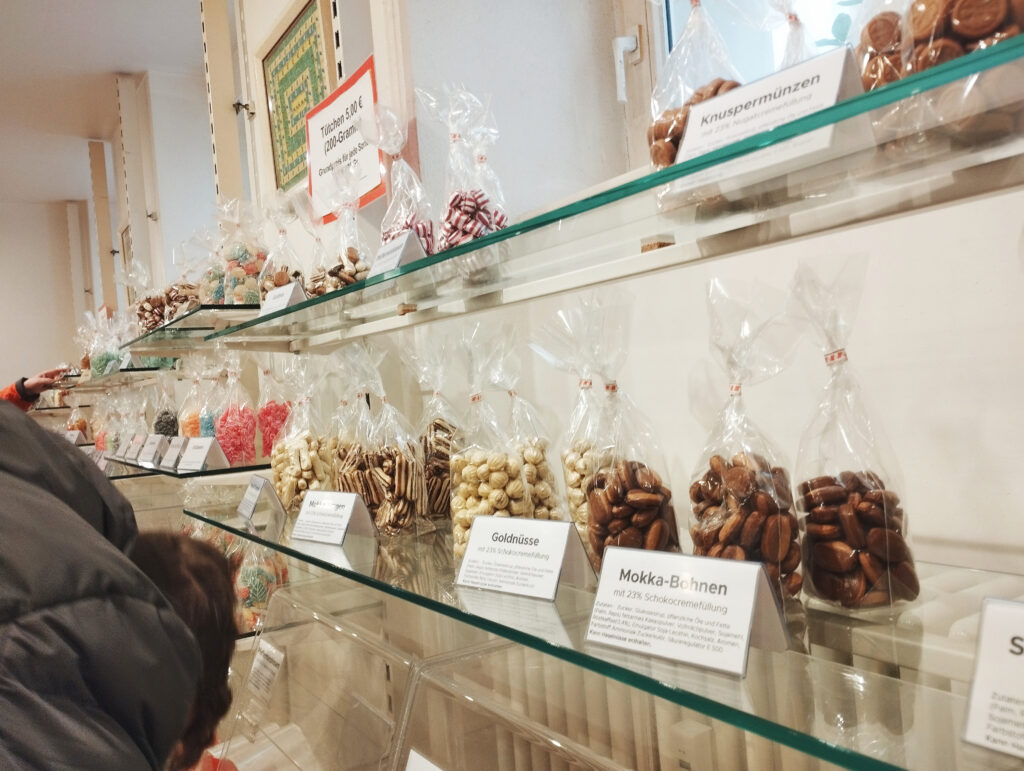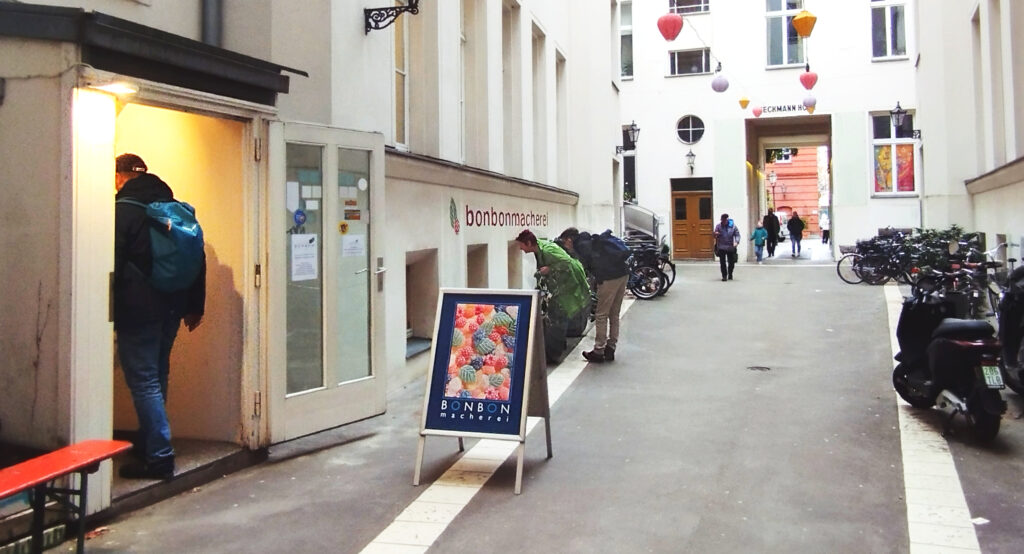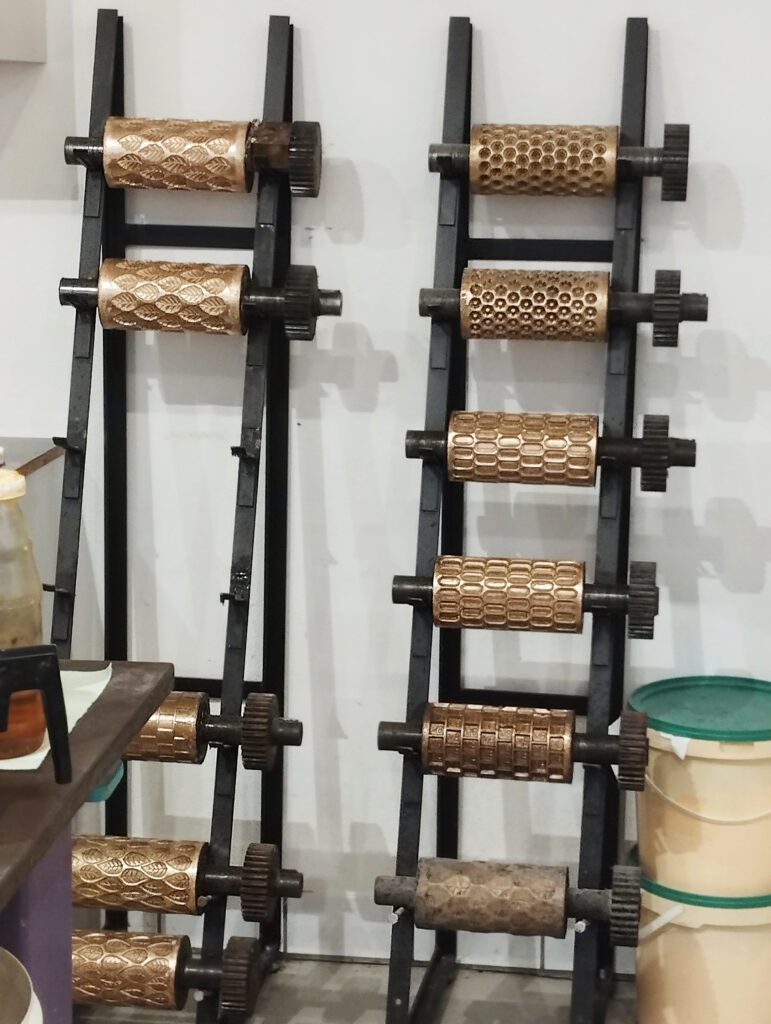A feature story by Lisa Maria Krause

Slowly, the machine turns the red sugar dough into raspberry drops. Hjalmar Stecher, owner of the Bonbonmacherei in Berlin, cranks the machine by hand, while explaining his work to the onlookers. “The candy has to be coated in powdered sugar, when it’s still hot,” he says. Most of the machines, the two-person business owns, are about 100 years old. The more “modern” ones are around 70 or 80 years old, Stecher recalls. Because of this, the shop’s energy bill has always been relatively low. Yet, the energy crisis has hit the Bonbonmacherei at Heckmannhöfe through other channels.
Sugar, flavored syrup, and water is all Stecher and his partner, Katja Kolbe, need to produce an abundance of different hard candy. Raspberry, caramel, or licorice? What brings most costumers back into the shop, located in the basement with entrance through the courtyard, are the signature recipes. They originate in Berlin. Most Berliners would recognize the taste of “Berliner Blätter” from other wood-ruff flavored candy any day. “We couldn’t keep the name Maiblätter,” Stecher explains. Another manufacturer has patented the widely recognized name for the leaf-shaped candy.
The prices for the few ingredients they need have risen drastically, influenced by the Covid-19 pandemic and Russia’s war on Ukraine. Propelled energy prizes result in higher production costs for ingredients. “Licorice salt suddenly costs 200 percent more. Glucose syrup, too,” states Kolbe from behind the counter. Their wholesale traders charge energy and delivery fees on top of that. Due to delivery problems, those fees have persisted since the start of the pandemic.”Luckily, we only need small quantities,” Kolbe, who is co-founder of the Bonbonmacherei, explains. Last time they had to order a new charge of syrup was in the beginning of 2022. But the two-person business cannot rely on a fixed price.
They never know when or how much for the prize paid they will actually get, Kolbe notes. Because of their infrequent ingredient restocking, the prize hike is delayed. The woman describes the prizes super markets set these days as “horror”. If these are the real prices for sugar that candy makers will have to pay on their next order, the increase could have a big impact on small businesses.
The candy makers raised their own prizes twice in one year. From originally 2,25 euro until January 2022 to 2,50 euro in October per 100 grams of candy. This equals a price increase of eleven percent. “This is unusual within a short time frame,” Kolbe admits. But she cites personal extra expenses as the reason. The candy maker explains how they have always lived “knapp vor Kante”, meaning with little extra money to spare. The two don’t have much leeway, when the energy crisis and inflation influence their living expanses.
That those effects also trouble their customers, the two sweets producers mostly see it with walk-ins rather than returning customers. Their hard candy is a small treat one can still afford, Kolbe believes. Most of their patrons know what they want and stick with it.

Their customers are who keep them afloat through thick and thin. They helped the Bonbonmacherei through difficult times. Ordering with a phone call during the pandemic is one thing, though. The two-person business sells the sweets “from the stove right into the mouth,” how Kolbe explains it. “We never got as many tips as the last three years,” she adds. Not long after this statement a customer tells her to keep the change. “Passt schon,”(That’s alright) he says with a smile.
A young man in a long winter coat comes down the stairs into the shop. After browsing the shelves with different candy packed in small plastic bags for a bit, he turns to the woman behind the counter. “The selection really hasn’t changed in years,” the customer states with a surprised but pleased look. He has visited the store as a little kid with his parents and grandparents long ago, he explains later. How the Bonbonmacherei sticks to the classics, brings back memories for him. Not long after, the young man leaves with a bag full of candy to gift to his family for Christmas.
This is not an unusual occurrence, Kolbe notes. Quite often the love for the traditional Berlin taste transcends generations. She remembers a study on senses she has read before. “Sense of taste and smell is not something you loose. Those are memories that always remain somewhere,” Kolbe recalls.
The couple prides themselves in being the first who offered an open kitchen for candy making. Twice a day they demonstrate their craft, free of charge. Another way the Bonbonmacherei has turned into an insider tip for tourists. The two insist that the brass pot for melting the sugar and water mixture has to be heated over a gas driven flame. Despite this, Kolbe and Stecher have no interest in energy-saving advice.

“Saving energy for what? Five euros a year?,” the seller retorts. There is no use in it with LED lights everywhere in the shop and barely any more energy to save, both of them believe. And yet, Kolbe reports of several energy saving consultants showing up in their shop. “They all left their business cards here,” she recounts. Consulting firms on energy-saving have reported an increased interest in their services by companies. Some say their number of on-site consultations has doubled.
The two candy makers already had to make some changes in light of the difficult situation over the past few years. Necessity certainly created the need to rethink previous structures. During the height of the pandemic, Kolbe decided to step down as co-owner of the Bonbonmacherei. Now, she is her partner’s employee. This way, she profits off the German statutory health insurance and short-term allowance. As an employee she also received 300 euro in energy prize lump sum by the government last fall. Though, that is but a mere drop in the bucket.
Political answers to the crises of today have been slow and unsteady. Especially small and midsize companies like the Bonbonmacherei seem to be overlooked. After Russia started its war against Ukraine, voices grew calling for support of the biggest energy producers in Germany. In wake of the energy crisis, the main companies driving the economy and offering jobs remained exclusively in focus. The first aid packages provided money to those companies with high energy consumption.
Only recently, attempts of support for smaller businesses have appeared on the federal state level. Despite those businesses being hit by increasing energy bills just as much as low income families. The Berlin senate offered a loan on a reduced rate to all companies and freelancers starting October 2022. This was not an option to Kolbe and Stecher. Barely any businesses took this opportunity, Stephan Schwarz, senator for economy, admitted. Though, he believes most people will be more interested in their grant program. This aid is still in the works and is expected to be implemented early 2023.
“I don’t know, whether this energy aid will apply to small and midsize companies, too. It’s not clear yet,” Kolbe comments, “Obviously, it would be nice.” The senate has yet to release clear directions whether people can apply for the financial aid online or whether companies with low energy costs are even eligible. “The question is, what is realistic? Free energy for everyone would be great, of course,” Stecher notes with a grin. His newest batch, seven kilograms of raspberry candy, is ready to be put on the shelves.